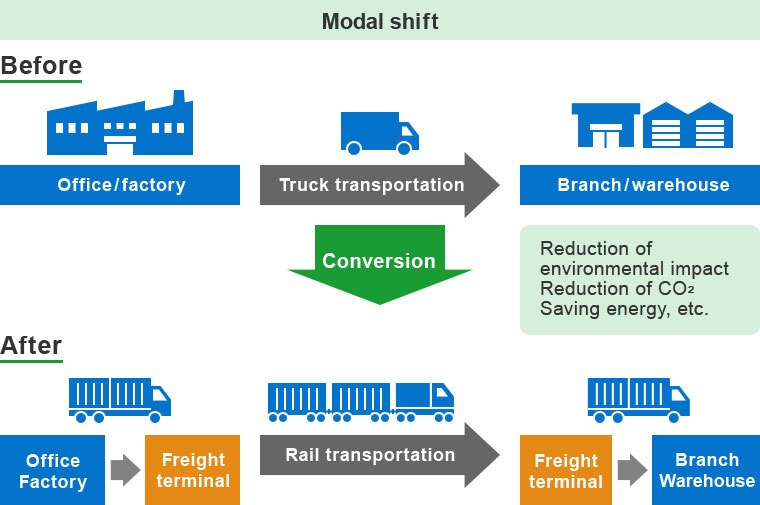Green Procurement and Logistics
Green Procurement Initiatives
Green Procurement of Raw Materials
As a manufacturer that uses 1,500 types or more of chemical substances, we examine environmentally harmful substances in all of the raw materials we purchase, and switch to substances that have less environmental impact, to provide products that are safe and have a minimal environmental impact.
We are striving to expand our green procurement, aiming to build a sustainable recycling-oriented society by prioritizing purchasing raw materials with minimal environmental impact and purchasing from clients that are environmentally conscious, according to our set selection criteria for clients, materials, and services.
Green Purchasing of Office Supplies
Many environmental issues form the background to the promotion of green purchasing, such as global warming, industrial waste, and exhaustion of resources. The Act on Promotion of Procurement of Eco-Friendly Goods and Services by the State and Other Entities (Green Purchasing Act), formulated in Japan in May 2000, states that "In the case of purchasing or leasing goods, or receiving the provision of services, business operators and citizens are to endeavor to select Eco-Friendly Goods, etc., to the extent possible."
In accordance with this, we have set and put into practice green purchasing standards to ensure as far as is possible the selection of products with one of the following marks or logos when purchasing office supplies: the Green Purchasing Act Mark, Eco Mark, Green Purchasing Network Mark, and the M Green Purchasing Mark.
In fiscal 2020 our green purchasing percentage for the company overall was 45.2%, which we acknowledge still leaves room for improvement. We will continue to engage in efforts to raise awareness internally in order to boost the consciousness of each person.
Logistics
Environmental Burden of Logistics
We consign product delivery to outside transportation companies. The Act on the Rational Use of Energy requires that companies transporting 30 million or more ton-kilometers annually submit transport volume notifications, but through cooperation with our partner transportation companies, we have adopted a modal shift while also taking initiatives to boost the efficiency of load factors in transportation and simplified packaging, so that our transport volume only comes to approximately 11 million ton-kilometers annually. Going forward, for long-distance transportation in Japan we will promote modal shifts, which have a large effect in reducing environmental impacts, with the aim of lowering the environmental burden. We aim to achieve highly efficient and consistently environmentally conscious transportation to our customers through regular training seminars held with our transportation companies intended to raise the quality of logistics.

